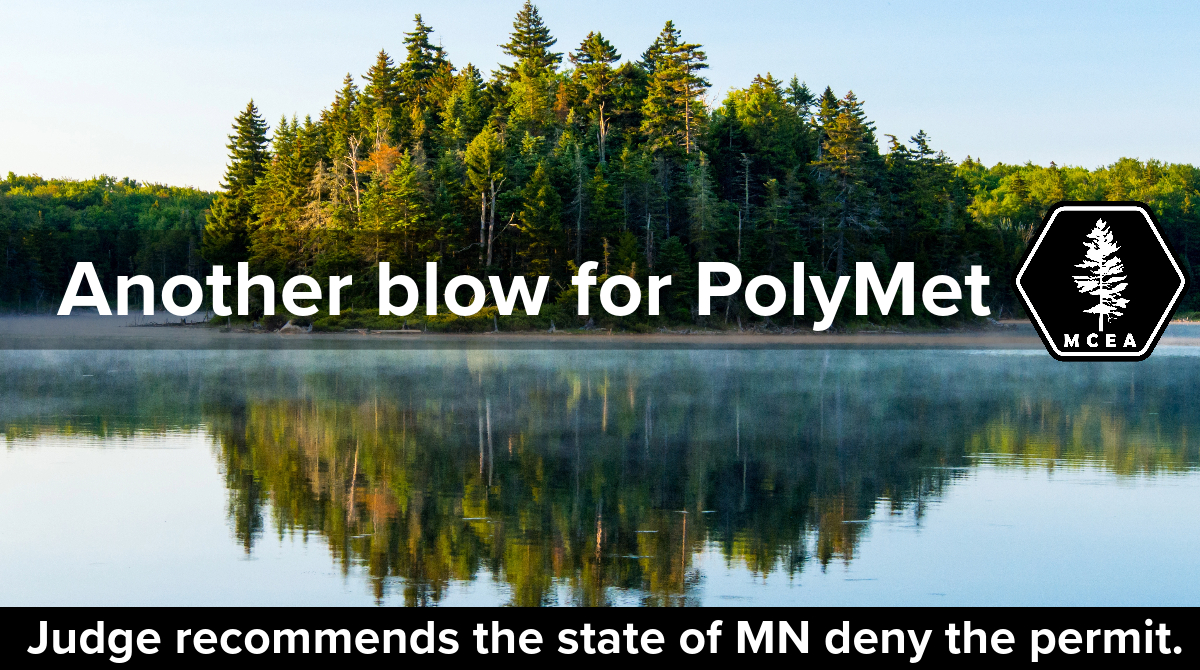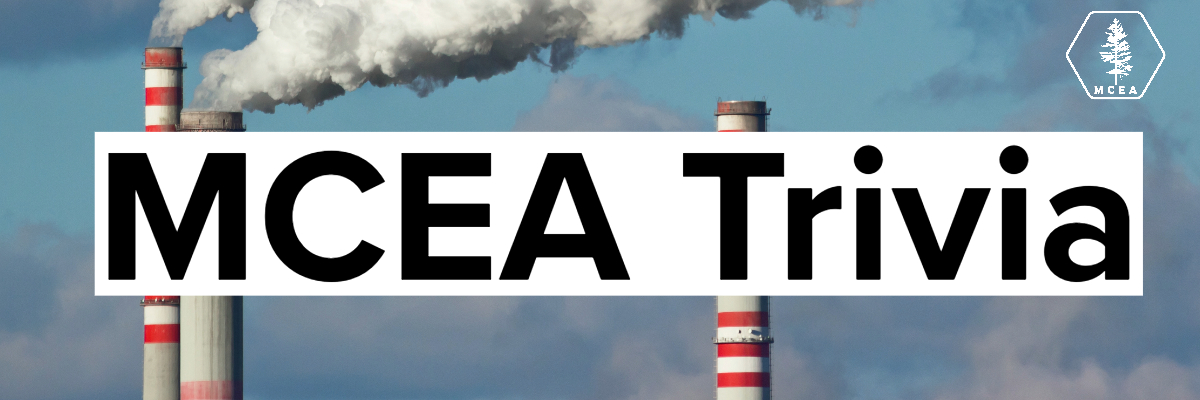November 2023 Newsletter

In this edition of MCEA’s Environmental Monitor:
- Find out the latest breaking PolyMet news
- Learn about the next phase of Minnesota’s “forever chemical” fight
- Find out more about shocking air permit violations uncovered by the EPA at Smith Foundry in Minneapolis
- Take action: tell state agencies to hold polluters accountable
- Read the breaking news on the nitrate-contaminated drinking water crisis your actions helped achieve and a recent court-win
- Check out a panel event on the global impact of mining last month
-
Trivia: see if you know how many sources of pollution could have their permits affected in 2026 under a new air pollution law

On Tuesday, Administrative Law Judge James LaFave issued a ruling that recommends that the Minnesota Department of Natural Resources deny PolyMet’s permit to mine application. This means that three major permits once issued to PolyMet have now been rejected by a court or agency, and further demonstrates that this dangerous sulfide mine proposal has failed.
“This is yet another repudiation of the permits issued to PolyMet, and should be the final nail in the coffin of this failed proposal,” stated Kathryn Hoffman, CEO of the Minnesota Center for Environmental Advocacy. “The administrative law judge reviewed volumes of evidence and expert testimony warning that PolyMet’s proposal would fail to protect people downstream. The Minnesota DNR should heed the judge’s clear recommendation that the permit to mine be denied.”
Join MCEA and deliver a clear message to Governor Walz to deny PolyMet’s proposed permit to mine. We made it easy to email him and DNR Commissioner Sarah Strommen.
Five years ago, the PolyMet permit to mine was rushed out the door just before Governor Walz was elected, it was not his decision. Now it is his decision. After telling Minnesotans that if the courts “ask for something different to happen, we of course will certainly honor that,” this decision should be easy. After repeated rejections of PolyMet’s permits it’s time to move on to something better. It starts by denying the PolyMet permit to mine.

Although it’s not unusual to find a member of the MCEA staff in a canoe, it doesn’t often happen on the job. This summer was different. MCEA water program director, Carly Griffith, jumped aboard this summer to collect water samples with PFAS expert and University of Minnesota professor Dr. Matt Simcik to test for PFAS “forever chemicals” in St. Paul and St. Cloud.
This month, they released an illuminating report that shows how wastewater discharges and sewage sludge spread on agricultural fields as fertilizer are both significant sources of PFAS in Minnesota’s waters.
Click here to read what inspired the report, what the findings show, and how it holds a key to controlling PFAS contamination in our state.
You can also download the report, watch our webinar detailing its findings, and read about the history of our PFAS work.
.jpeg)
Pictured left: MCEA Healthy program director and attorney, Evan Mulholland, speaks to the crowd while MPCA staff look on. Pictured right: More than 100 community members gather for the meeting
Pollution violations discovered by federal agency in Minneapolis
On a cold night in November, MCEA Healthy Communities Program Director Evan Mulholland and other MCEA staff bundled up to rally outside of the Smith Foundry in Minneapolis. The event was in response to news that broke earlier in the week that surprise visits to the facility by the U.S. Environmental Protection Agency (EPA) had uncovered shocking air violations. Chief among them: some of the facility’s baghouses, filtering devices intended to control dangerous particulate matter (PM) pollution, didn’t function and failed to capture much of the facility’s PM, causing dangerous conditions for workers and increased risk to residents. In addition, the foundry did not keep required records, and the EPA found that Smith Foundry had nearly double their permitted emissions.
The Minnesota Pollution Control Agency (MPCA) knew about the findings from this surprise inspection in May and didn’t relay the information to anyone living in the area. This week, MPCA held a community meeting for East Phillips residents. Representatives from the EPA and Smith Foundry also spoke at the meeting. MCEA’s Mulholland was one of three speakers to represent the community. He explained that neither the company nor regulators actually know what is coming out of the facility’s unfiltered smokestacks and called on MPCA to conduct comprehensive testing to determine which pollutants are emitted into the neighborhood. In the meantime, Mulholland argued, the plant should be shut down.
Community members spoke about the grief of their children developing asthma and heart conditions, having to close their windows and remain indoors because of pollution, and the exhaustion of feeling unprotected by state agencies. Parents of children at a daycare facility a block away from the foundry described having to choose between a daycare that they loved and the risk to their children's health. Local legislators were furious with the lack of action and mixed messages from the MPCA.
This story has resonated with people across Minnesota. Check out photos from the meeting and get a link to MPR's coverage.
We need state agencies, including MPCA, to protect Minnesota’s people and environment from pollution. This is especially true in areas that have been treated as industrial sacrifice zones for decades. Help us send that message to our state agencies by taking the action below.
.jpeg)
The surprise inspection at the Smith Foundry by the EPA is just the latest in a long list of times the federal government has had to step in to hold polluters accountable in Minnesota after our state agencies have failed to do so.
This is why we’re calling for a change.
Take action with us today and call upon our Governor and our state agencies to make three commitments to better hold polluters in our state accountable:
Take immediate action when companies violate our laws. Anytime there is a violation that poses a risk to Minnesota’s public health, safety, or natural resources, seek an immediate, temporary shutdown of the polluting facility until the problem is fully resolved. Seek the maximum penalties allowed for any facility that breaks the law and pollutes. Triple the enforcement budget of the MPCA. State agencies need more resources to regularly inspect facilities and pursue enforcement action and penalties.
.jpeg)
MCEA and our friends and allies working to address the nitrate-contaminated drinking water crisis affecting thousands of residents in the karst region got huge news this past month. Seven months after we filed a petition asking the EPA to use its emergency authority to protect drinking water in southeastern Minnesota, the federal agency stepped up.
Due to the area’s karst topography, pollution from land-applied fertilizer and manure seeps easily into the groundwater. This groundwater is the only source of drinking water for much of the county.
The federal agency sent a letter to the Minnesota Department of Agriculture, the Minnesota Department of Health and the MPCA telling them in no uncertain terms that they needed to work together to immediately address the public health emergency. This included directing the state to provide safe drinking water free of charge to over 9,000 people with polluted wells.
The EPA also directed state agencies to use longer-term prevention measures, like changes to the feedlot permit and nutrient management practices, to reduce nitrate pollution before it contaminates drinking water. The story got widespread media coverage. Click here to read the story that was published in The Reformer.
Thank you to everyone who signed our call to action urging a response to this issue. We are so powerful when we come together.
.jpeg)
Last week also brought a big legal win for local control and the fight for clean, safe drinking water in southeastern Minnesota. A Minnesota court upheld Winona County’s ability to protect residents’ drinking water from nitrate pollution by limiting the size of large animal feedlots in the county’s vulnerable karst landscape.
The district court order affirmed the Winona County Board of Adjustment’s decision to deny a variance request from the area’s largest feedlot - Daley Farm. If Daley Farm had been successful in undermining this ordinance, the expanded feedlot would have created more than 46 million gallons of manure and wastewater annually that would have been spread on nearby farmland. That’s more than twice the waste produced by the entire human population of Rochester.
MCEA stepped into the ongoing court battle to represent a group of Winona County residents last January. Both this win and the EPA’s response to state agencies are progress toward a future where all Minnesotans have clean drinking water.
Read our press release for the full story.
Thank you to the hundreds of donors who helped us hit our goal this Give to the Max Day! We are so grateful for your investment in the future.
As the environmental law nonprofit for the entire state of Minnesota, we feel both the weight of this moment and its possibility. With the taste of wildfire smoke in our mouths this blisteringly hot summer, we no longer need to convince people that climate change is real. Instead, we find ourselves convincing folks to have hope, and to roll up their sleeves because we won’t settle for a bleak future without a fight.
So many of you joined the fight for a better future - 432 people helped us raise $142,491. We are so grateful. And with your support, we’re just getting started.

Pictured left: MCEA’s Northeastern Director and other panelists gather for a UMD event this month. Pictured right: Group photo of a delegation in Azacualpa, Honduras, at the site of a cemetery desecrated and moved for the benefit of US-based Aura Minerals.
MCEA joins discussion about the global impacts of mining
Earlier this year, four MCEA staff members joined a delegation to Honduras organized by the human rights organization Witness for Peace. As an organization that works on mining issues here in Minnesota, MCEA was grateful for the opportunity to put our local mining work in the global context, and learn directly from communities impacted by the industry elsewhere in the world. Joining the delegation from MCEA were JT Haines, Kathryn Hoffman, Adam Reinhardt, and Katie Cashman.
This month, JT Haines, who directs MCEA’s Northeastern Minnesota program, participated in an event hosted by the University of Minnesota Duluth and the College of St. Scholastica to discuss the global impacts of mining. He was joined by Senator Jen McEwen, Fond du Lac Tribal Elder Ricky DeFoe, co-delegates Jenna Yeakle from Sierra Club, Shanai Matteson from Honor the Earth, and Jackson Faris.
It’s a privilege to be a part of a conversation about how the struggle for justice and a clean environment in Honduras relates to our work in Minnesota. We expect to participate in similar events in the future and will share details when they are available.

Last session, Minnesota law-makers passed the Cumulative Impacts law, which addresses the accumulation of air pollution in environmental justice neighborhoods through permitting reform.
According to the MPCA , how many permitted sources of pollution could be affected by the new law?
a) 24
b) 123
c) 74
d) 12

MCEA is Minnesota’s leading nonprofit environmental law and public policy organization working to protect our environment and the health of our people.